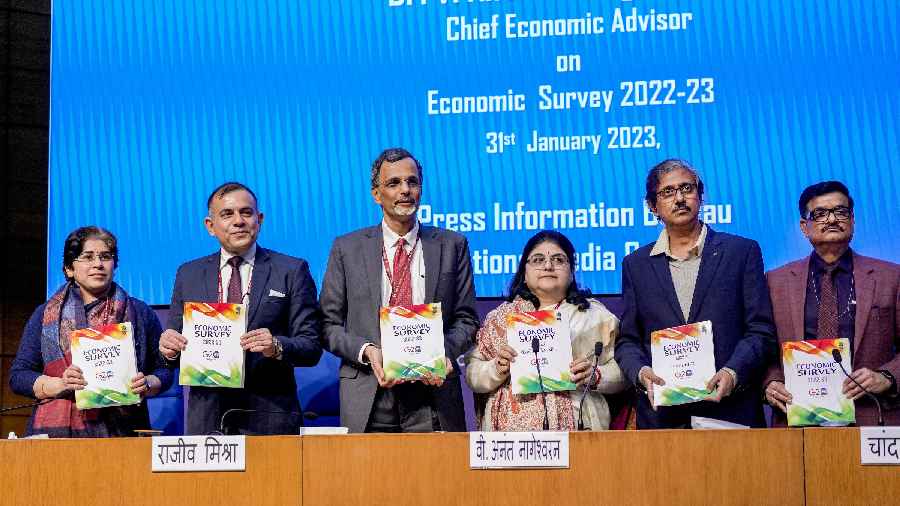There’ll be no big giveaways in Wednesday’s budget, the last full-year spending before next year’s national elections. Prime Minister Narendra Modi’s government is going to keep a firm hold on its purse strings and economic growth is seen slowing in this financial year to 6.5 per cent from an estimated 7 per cent last year and 8.7 per cent in the previous year.
The economy is expected to continue losing pace due to ongoing tight global financial conditions and supply chain disruptions worldwide. The government’s emphasis, meanwhile, will be on infrastructure spending to boost growth and asset sales to raise revenues.
Those are the key takeaways from the Economic Survey, the annual economic report card presented a day ahead of the budget. “With the continuing global risks and uncertainties, the availability of fiscal space with the governments has become paramount,” said the survey presented by Union Finance Minister Nirmala Sitharaman on Tuesday.
The government said it’s going to keep rebuilding its fiscal headroom that was eroded by public spending to offset the effects of the pandemic and related economic weakness.
The government is aiming to trim the budget deficit, which currently stands at 6.4 per cent, and keep a tight lid on spending to maintain room for policy action in a risky global environment in the wake of Russia’s invasion of Ukraine, the report suggests.
The government may seek to take the budget deficit to below 6 per cent, the Survey indicates. The fiscal deficit is the difference between the government's total revenue and total spending.
The Survey, written by the finance ministry’s Chief Economic Adviser V Anantha Nageswaran, says there’s no need for panic. But “there is a need for continued vigilance and adherence to the path of fiscal prudence,” the report says.
Downward pressure on the rupee, meanwhile, is likely to continue if the US Federal Reserve keeps increasing interest rates. While inflation may be coming off its highs, it’s still entrenched in India and worldwide. This means the interest-rate hiking cycle will continue and borrowing costs will remain “higher for longer,” the survey says.
But the good news is the central bank’s projection of 6.8 per cent retail inflation is neither too high to deter private consumption, nor so low as to weaken inducement to invest, the survey says.
Bright spots in the economy include the country's civil aviation sector which has “great potential” amid growing middle-class demand and higher disposable incomes, the report says. Unsold housing inventories are starting to fall as demand picks up. The survey forecasts FDI (Foreign Direct Investment) will rebound due to the country’s strong growth. There’s buoyancy in the real estate sector and a pickup in job-creating construction projects.
But while commodity prices have come off their peaks, they remain high in the wake of Russia-Ukraine conflict. “Strong domestic demand amidst high commodity prices will raise India’s total import bill,” the survey says.
This could lead to “unfavourable developments in the current account balance” that “may be exacerbated by plateauing export growth on account of slackening global demand. The current account reveals the pattern of foreign trade, showing a country's imports and exports of goods and services.
The finance ministry’s growth projection of 6.5 per cent is higher than the IMF’s forecast of 6.1 per cent. If the finance ministry’s estimate proves correct, India will remain the world’s fastest-growing economy.
Even though the government is unlikely to present any populist spending measures to garner favour among the electorate in Wednesday’s budget, there is always room for vote-winning proposals in next year’s interim budget which is traditionally presented before the election.












